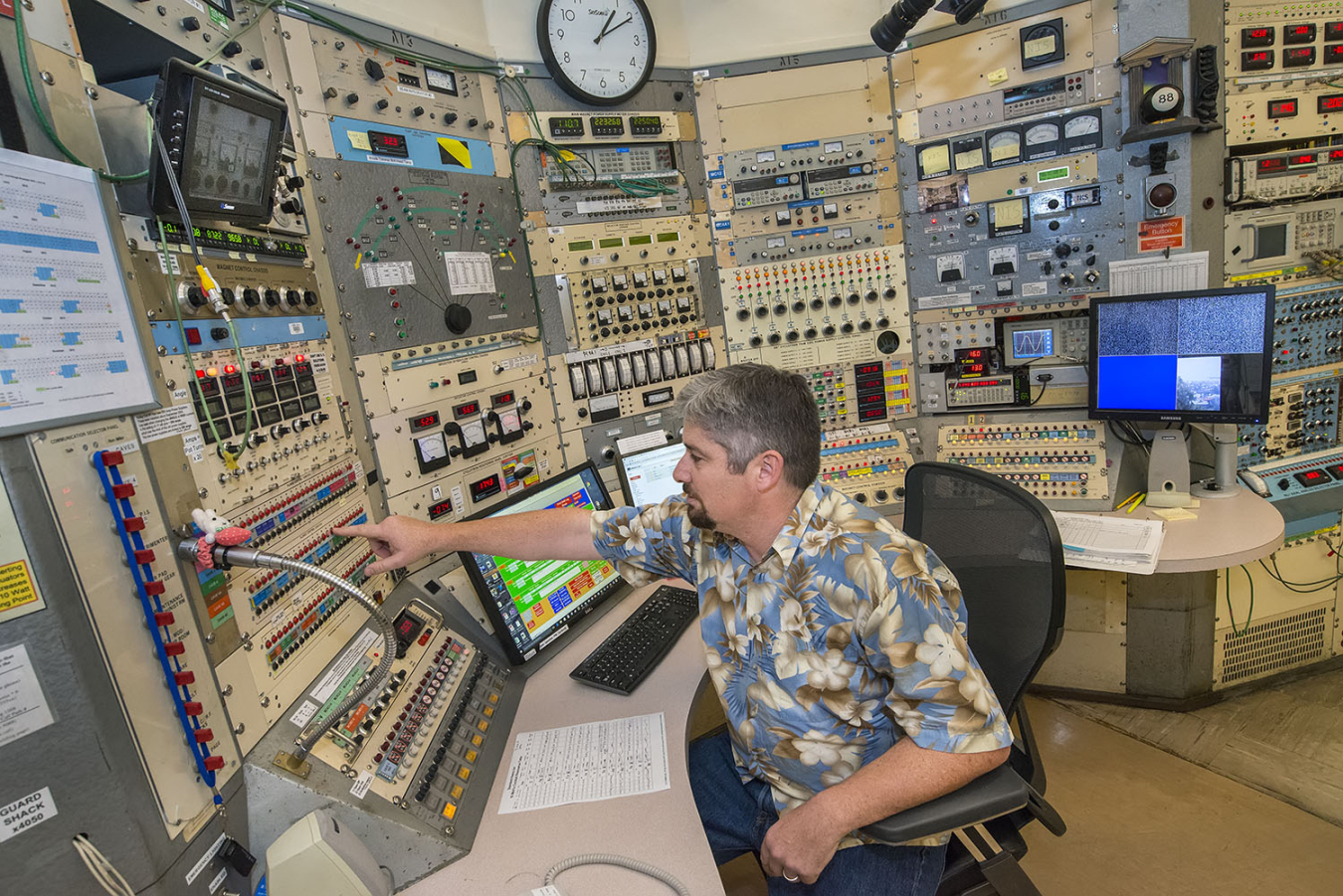
Michael Johnson served in the Navy and now works as a research coordinator for Berkeley Lab. | Photo by Roy Kaltschmidt, Berkeley Lab
When Michael Johnson was in high school, he developed a talent for music. He never left California but dreamed of traveling the world and serving in the armed forces as a musician for the United States Air Force. His audition for the Air Force Band was rescheduled numerous times, delaying his musical ambitions but opening up new opportunities.
“I was talking to a buddy of mine who was telling me all about the Navy and their Naval Nuclear Power School, which intrigued me,” Johnson said. “I was beginning to consider that a career path in the Nuclear Navy may lead to greater opportunities and likely more transferrable skills than music.”
Johnson enlisted in the Navy, qualifying for entry into the Nuclear Field “A” School as a Naval Nuclear Propulsion student, later graduating as an Electronics Technician before advancing on to the Naval Nuclear Power School (NNPS). With its extremely fast pace and high academic standards, NNPS is one of the most demanding in the U.S. military. NNPS students typically spend 45 hours per week in the classroom, and are required to study an additional 10 to 35 hours per week. However, some coursework and materials are classified, making it difficult to study outside of the classroom.
Johnson said the challenges and demand of completing NNPS helped shape his outlook and future career paths. “The academic rigor, rapid timeline, and huge emphasis on performance and integrity really set me up for life. Everything has been easy since then.”
After completing the NNPS program, Johnson qualified as a reactor operator and was stationed at the Nuclear Power Training Unit in Ballston Spa in New York. “It is a little surreal to think about now,” Johnson said. “I was just over 19 years old and pulling control rods out of the core, effectively starting up the nuclear reactor.” As an operator, and later an instructor, Johnson was responsible for controlling, upgrading, troubleshooting and repairing many of the reactor’s systems. “I was able to log over 8,000 hours under the DOD’s [Department of Defense’s] Apprenticeship Program, helping me work towards a journeyman credential,” Johnson said. The United Services Military Apprenticeship Program is a formal military training program that provides active duty service members the chance to improve job skills and to complete civilian apprenticeship requirements. The U.S. Department of Labor (DOL) provides service members a nationally recognized certificate upon program completion. Originally established in 1976 as a Navy program, the three Sea Services merged into a single program registered with DOL in April 2000.
In addition to his academic and hands-on experience, Johnson became heavily involved in research and demonstration projects. He helped develop neutron detector prototypes and provided technical assistance and operational support for a new reactor used in Seawolf-class submarines.
Aware of the importance of obtaining industry recognized credentials, Johnson decided to pursue a traditional academic degree and enrolled at Thomas Edison State University to attain an Associate in Science in Applied Science and Technology with a specialization in Nuclear Engineering Technology, a program designed for reactor operators and other workers in the nuclear industry. Using the discipline and life balance techniques he developed while completing NNPS, Johnson finished the Associate’s degree by taking evening classes, despite already being a Nuclear Power Training Unit instructor during the day.
Notwithstanding actively serving in the Navy and being an involved father, Johnson would go on to complete a Bachelor of Arts in Natural Sciences and Mathematics through the university.
After 8 years of service, Johnson left the military but not before making stops in Japan, China, the Persian Gulf, Australia, Hawaii, Alaska, and the Panama Canal - just to name a few.
Successfully securing gainful and meaningful employment soon after military separation is not always easy. Johnson’s prior military experience and education quickly awarded him a position in the tech industry. However, the tech market crashed in the early 2000s and Johnson, like thousands of others, found himself seeking new employment within a highly competitive market. “Then I saw an ad for a cyclotron operator and it was a perfect position for someone like me,” Johnson said. “All of my prior nuclear and electronics training came into play.”
Johnson’s unique background opened the door to a rewarding career at the Energy Department’s Lawrence Berkeley National Laboratory, where he has proudly contributed to the lab’s vibrant scientific community for over 17 years. Given his interests, career path and the supportive work environment, he has since completed a Master of Science in Space Studies through American Military University. He currently works as a Senior Scientific Engineering Associate and Research Coordinator for the 88-inch cyclotron, a machine that accelerates ions to high energies along a circular path.
“Since 1979, most American satellites have had one or more electronic components go through Berkley Lab’s cyclotron,” Johnson noted in a 2015 article highlighting the accelerator. Research at the cyclotron has helped advance space exploration and includes breakthroughs related to vehicles, materials, and more. The cyclotron can also simulate conditions electronics will be exposed over years in a matter of minutes.
Johnson credits his continued success and professional development to not only the life-long impact serving in the Navy and completing NNPS had on preparing him for life, but also to the support and inclusive culture of Berkeley Lab. From opportunities for continued academic achievements, to on-site emergency medical technician training, the lab facilitates a sense of community. Berkeley Lab founder Ernest O. Lawrence believed that scientific research is best done through teams of individuals with different fields of expertise, working together. This legacy continues today through veterans like Michael Johnson.